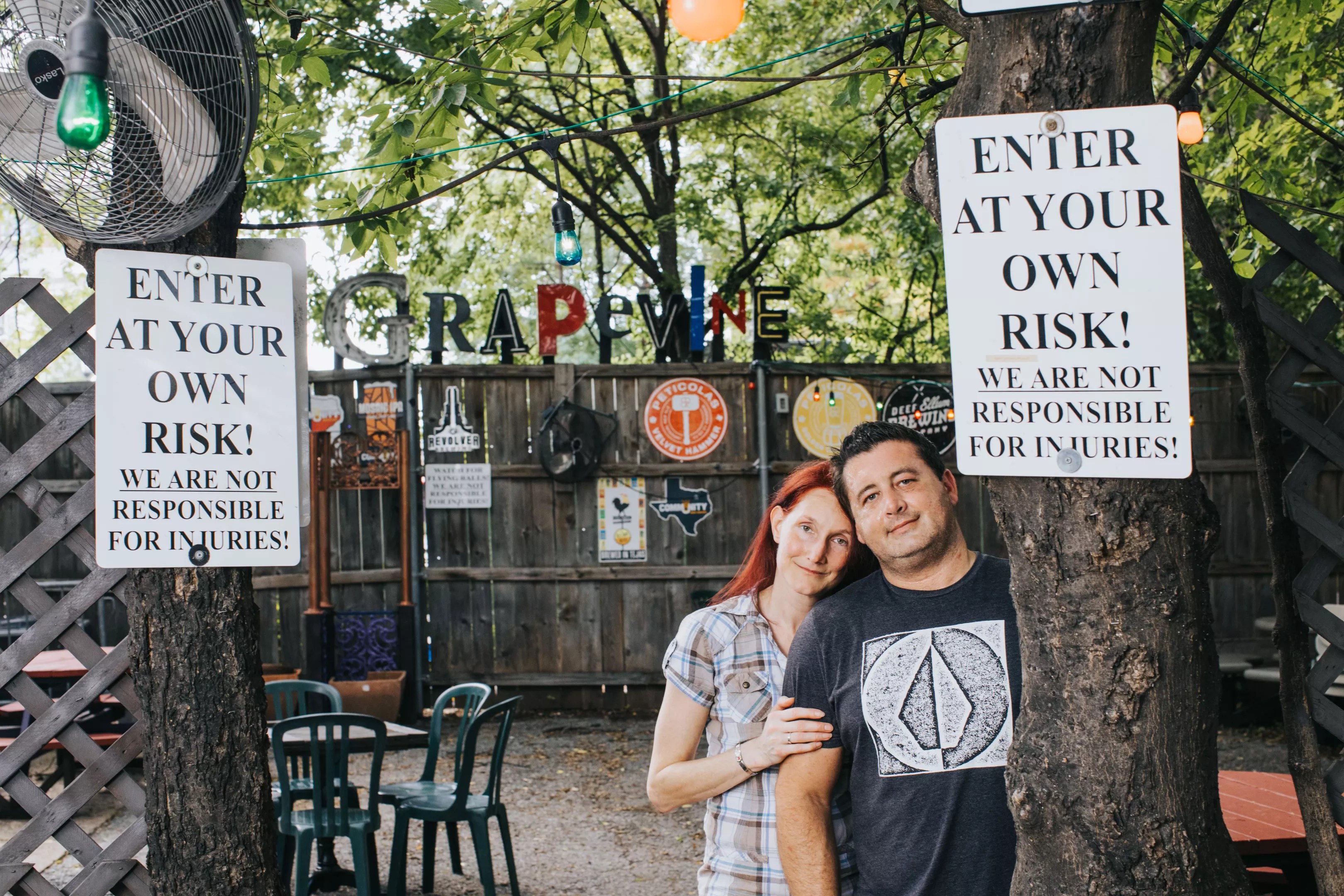
Kathy Tran

Audio By Carbonatix
Dive bars don’t happen by design. There’s no script or blueprint. They’re unimpressed with plans. Usually they have odd touches of character in both people and furnishings that just fall into place. Over time, they evolve into a retreat where we yearn to wet our whistles.
The Grapevine Bar seems to have nailed it. Known for its seasoned regulars, salty bartenders and vintage grandma chairs, the old-soul neighborhood spot occupies a special place in the Dallas booze scene.
In normal times, it’s an offbeat reprieve, but these aren’t normal times. Ever since shelter-in-place orders were issued in March, the slushy machine that swirls Everclear-laced Bellinis has sat empty. The basketball goal on the patio hasn’t gone “kadunk” once, and the deck upstairs has been alone every sunset.
In May, when bars were allowed to reopen their outdoor seating areas, owners Michelle and Ronny Honea could have taken full advantage of their large open-air space. Instead, they made a deliberate choice to keep it closed. They’ve seen firsthand how the disease caused by the coronavirus ravages the mind, body and spirit. The risks are too high. Their customers and staff mean too much.
Like Chad Stites, who discovered the bar 20 years ago.
“I was looking for a safe haven. I came from Granbury to Fort Worth, where I felt a little more safe,” Stites says. “But, I still just didn’t feel comfortable in my own skin.”
He settled in Dallas, where he soon discovered a quirky little spot in Uptown along Maple Avenue.
“Walking into The Grapevine for the first time, it was like finding Disneyland. I was safe. No one cared who I was or that I was gay. … I could be whoever I wanted to be.” – Grapevine regular Chad Stites
“Walking into The Grapevine for the first time, it was like finding Disneyland. I was safe. No one cared who I was or that I was gay. I felt relaxed there. I could be whoever I wanted to be,” Stites says.
Having formed “amazing friendships” with both the staff and other customers over the last two decades, Stites usually camps out at the bar. He likes to watch new people wander in. Perhaps they found the place on a “Best of” list, or someone posted about meeting the love of their life on the basketball court out back or they had the most amazing first date throwing back frozen Bellinis on mismatched sofas.
Some newcomers might be surprised that such a small place (inside) carries such a mighty reputation.
“After they walk in, they’ll look around for a minute,” Stites says with a slight laugh, “and they’ll ask the bartender ‘What kind of … what is … is this a gay bar?’ And one time the bartender smiled and answered, ‘No, it’s an everything bar.'”
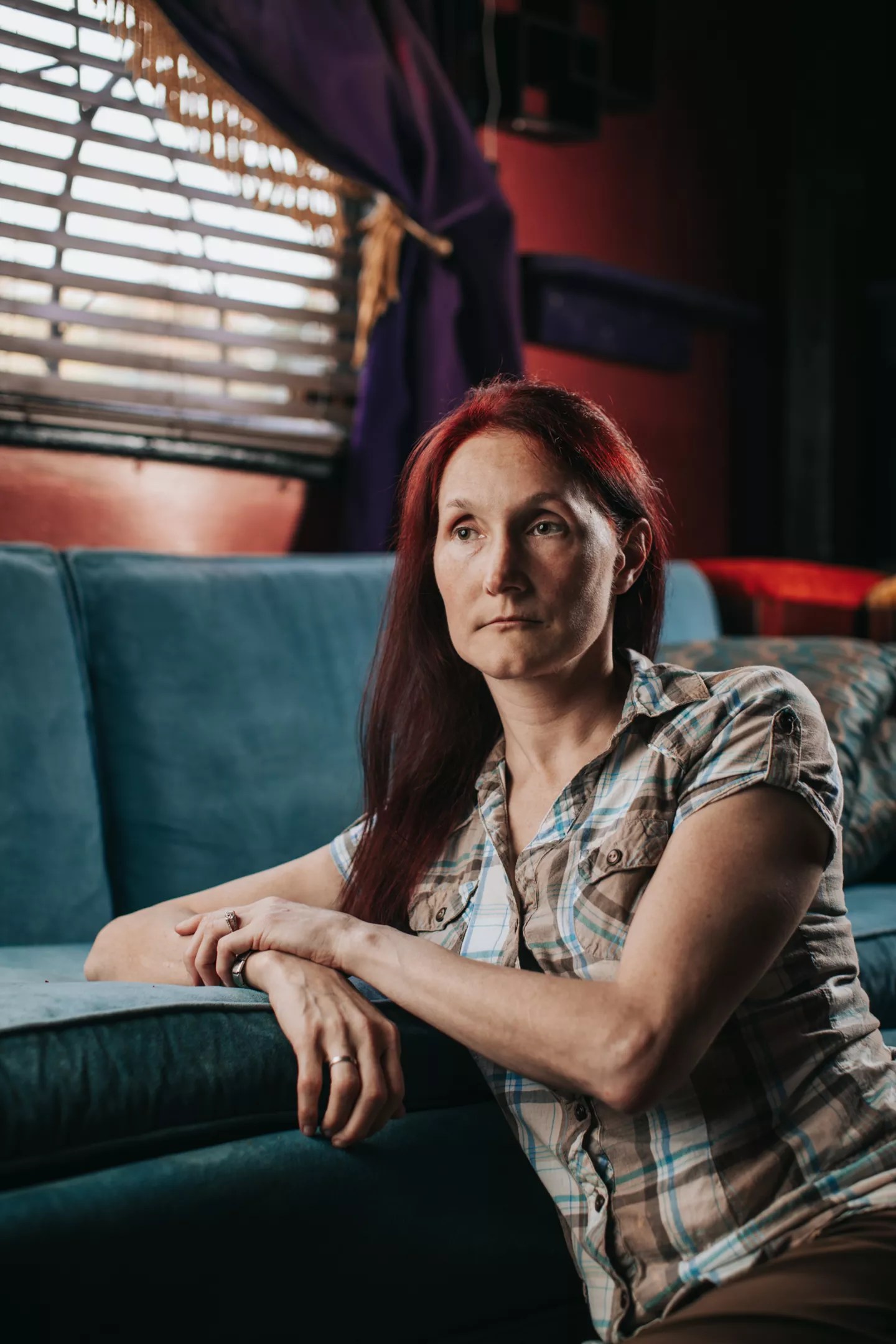
Michelle Honea has owned the Grapevine bar since 1996.
Kathy Tran
••••
Michelle Honea and her first husband, Richard Fiaschetti, who passed away in 2003, bought the spot that is now The Grapevine Bar in 1996. They poured everything they had into it. She was an engineering student by day while Fiaschetti waited tables for extra cash. At night, they worked on transitioning the former Herrera’s Mexican Cafe into a neighborhood wine bar on a shoestring budget.
After his restaurant shifts, Fiaschetti would invite co-workers in the service industry over to their new establishment for drinks. Honea’s desire for a wine bar gave way to those early customers who needed something a little stronger after getting off the job. Still, she’s always kept a few nicer bottles behind the bar for those who prefer fermented grapes.
The row of mismatched chairs and other accouterments that fill out the bar were collected from resale shops and estates sales. They’re all essential to the offbeat vibe that has struck a chord with so many people over the years.
But, the staff has long been the spackle binding the elements that makes The Grapevine Bar what it is. Its newest employee was hired more than two years ago.
Kevin Nicholson has worked there for 22 years. Jon Bryan started tending bar in 1998. Keeping employees around for a year in the restaurant and bar industry is pretty hard to do, yet alone decades.
“It’s not the four walls; it’s the people in it. Losing our staff would be terrible.” – owner Michelle Honea
“Customers don’t come here for the building, or he and I,” Honea says, pointing to her husband, Ronny Honea. “They come here for the staff. And because of the environment, and because of the other customers that they’ve met here. It’s not the four walls, it’s the people in it. Losing our staff would be terrible.”
Those people are why, when Dallas County ordered all restaurants and bars to shutter March 17, The Grapevine Bar obeyed without flinching. A couple of weeks later, the Honeas had to persuade their employees to apply for unemployment.
“They said they didn’t want to file because they didn’t want it to hurt us,” Honea says, throwing her arms in the air in love and frustration. “We had to tell them that we didn’t have to contribute to it right now,” referring to the state’s exclusion on charge-backs to employers for unemployment payments during the pandemic.
Why would the employees put worries about their bosses over their own finances?
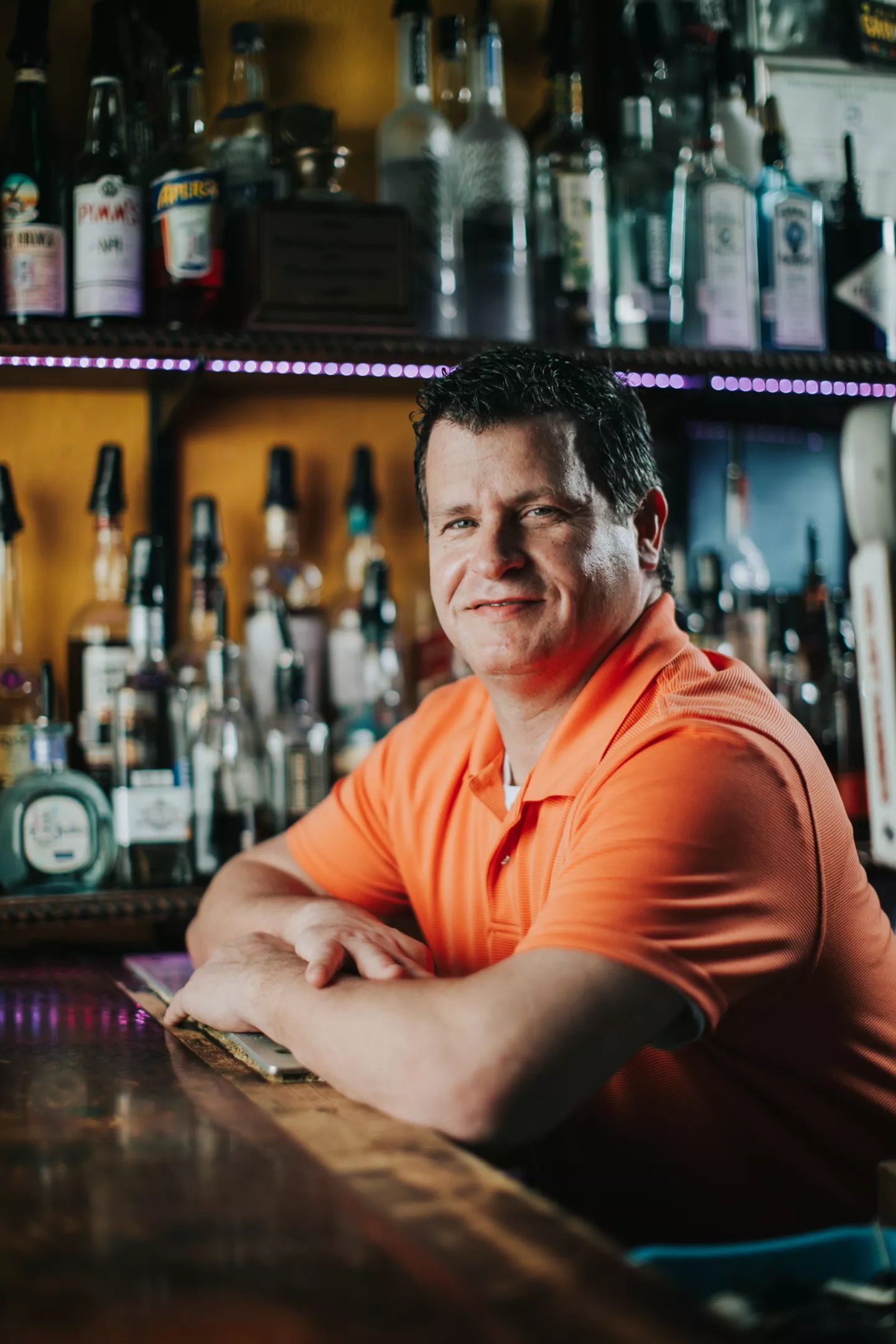
Grapevine bartender Kevin Nicholson
Kathy Tran
“It’s a mutual respect and care,” Nicholson says. “There’s a huge amount of respect, and it goes both ways.”
Honea’s demure disposition and features don’t seem fitting for someone who has built one of the city’s most popular dive bars. Some might think she’s too soft spoken for the job. But Stites swears one would be foolish to mistake her easy manner with her ability to manage a bar and all the duties that come along with it. He echoes Nicholson’s stance about respect.
Last October, when a tornado passed over Nicholson’s house and was tracking toward the Honeas’ home, he called them right away to make sure they were aware of what was happening around them.
“We heard the sirens go off, and then we could hear the tornado. It sounded like a freight train. Something hit the front door and busted it open, so I went back out there to hold it shut. It only lasted like 20 seconds,” Ronny said.
Fortunately, no one was hurt, including their dogs, but their house and surrounding space suffered more than $200,000 in damages.
They knew the city was overwhelmed with the cleanup, so they spent the next two weeks clearing debris, feeding branches into wood chippers and having it hauled off.
“It was literally a full-time job dealing with the insurance and adjusters,” Michelle recalls of the days and weeks afterward. “Our cell phones didn’t work, we didn’t have internet for two weeks. We were sharing a vehicle because mine was under a tree.
“I’ll never understand how people who have kids and had to get up and go to work the next day did it,” Michelle says.
Because the Honeas had a whole crew holding down the bar while they dealt with the aftermath at home, business was humming along as usual.
“We’re so lucky because we knew they could take care of the bar, and we could concentrate on our house,” Honea says.
••••
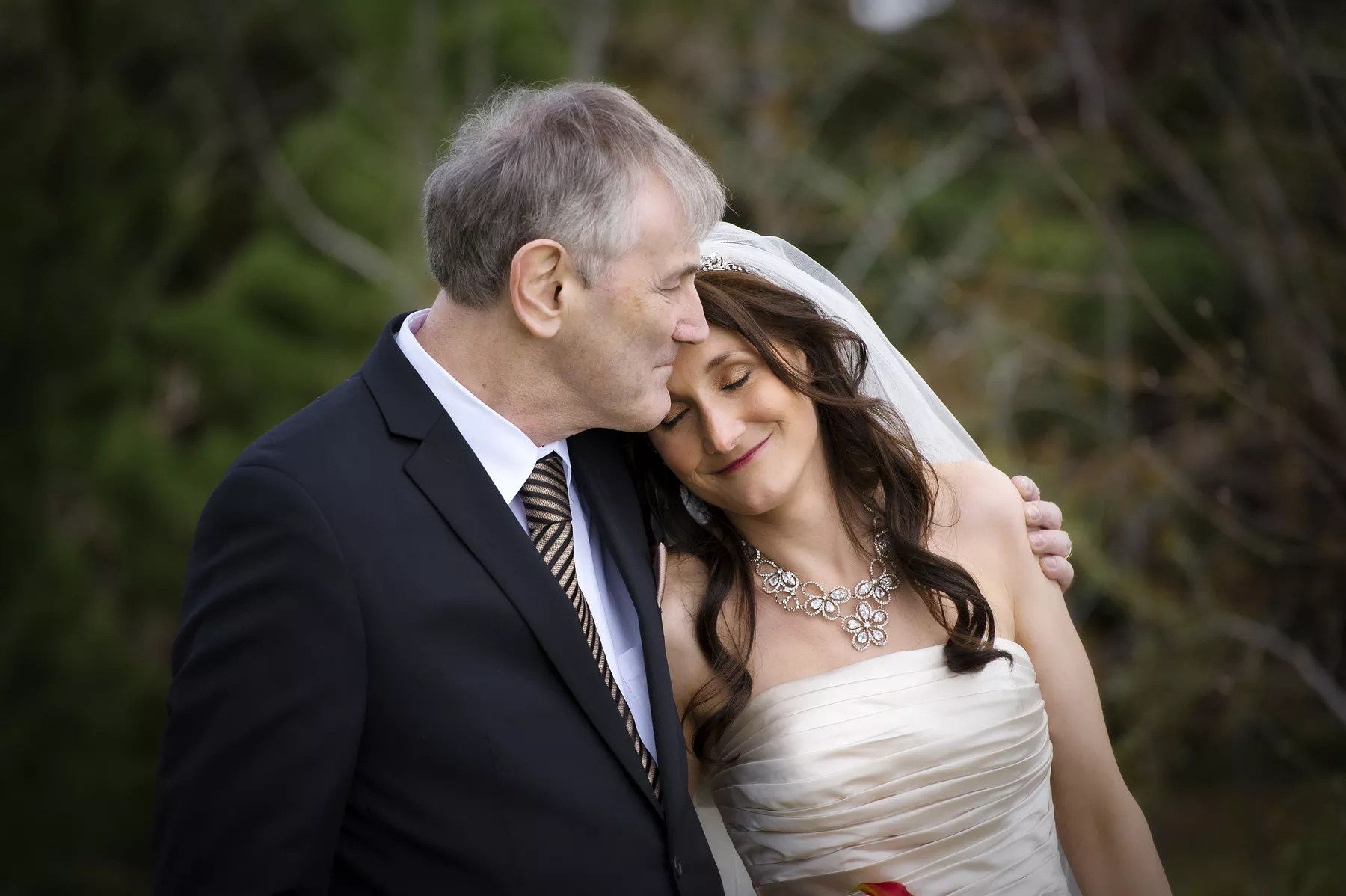
Michelle and her father, William Neumann, on her wedding day
courtesy Michelle Honea
Michelle Honea’s father, William Neumann, has worked as a certified public accountant for more than 30 years. He rents office space just outside of Detroit. Even at the age of 75, he loves the hustle of his career leading up to April 15, tax day.
Beginning in March, as COVID-19 swelled into a pandemic, he started asking clients to wait in the lobby outside his office where he had place bottles of hand sanitizer. Around St. Patrick’s Day, a secretary to one of the other professionals in the building came to work with a fever and flu-like symptoms. Later, Neumann found out she tested positive for COVID-19.
March 23 was the last time Neumann went to his office. Soon afterward, he came down with a fever.
March 25, his wife, Mary, also developed a fever. By the following evening, William was on the phone with 911 after Mary had fallen and he wasn’t able to help her up because he was too sick and weak.
The emergency medical service that arrived that night didn’t take Mary to the hospital. The couple had already been tested for COVID-19, but their results wouldn’t come back positive for another five days, and for whatever reason, the paramedics weren’t too concerned.
Friday morning, Mary fell again. William called 911 again. They assisted with getting her back in bed, but wouldn’t take her to the hospital despite underlying health conditions and a rapidly deteriorating situation at their home. Mary didn’t have the strength to get out of bed the remainder of the day.
March 27, William, who was now in his fourth day with COVID-19, called the EMS for a third time in two days. They took his wife to the hospital after she explicitly told them she was struggling to breath. Three days later, Mary Neumann was placed on a ventilator.
“Everyone in that office building caught COVID-19,” Michelle Honea says.
Her father was isolated at home alone in Michigan, battling his own disease while his wife was alone at the hospital fighting for every breath.
••••
After Mary Neumann was placed on a ventilator, she struggled to improve. She contracted MRSA, a deadly, antibiotic-resistant bacterial infection. Following weeks on the ventilator, mucus had begun to crystallize in the back of her throat. She had a tracheostomy procedure to move her breathing tube from her mouth to her throat. The doctors also replaced the feeding tube that ran through her nose with a gastric feeding tube.
All the time, Michelle Honea was in contact with her stepsister and niece to keep tabs on her father, trying to determine his true condition and constantly comparing notes.
“COVID is supposed to be about a two-week thing,” Michelle says. But, her father wasn’t getting any better, and after three weeks, he was admitted into the hospital.
The loneliness both were experiencing was overwhelming, particularly for Mary.
“Just imagine being in there for weeks and no one you know comes in to see you. Even the nurses have on masks, and you can’t see their faces.” – Michelle Honea
“Just imagine being in there for weeks and no one you know comes in to see you,” Honea says. “Even the nurses have on masks, and you can’t see their faces.”
After about a month in the hospital, William Neumann was released. Going home was hard for him without his wife there, knowing she was struggling to overcome the disease that had enveloped her lungs. But, eight days later, he had to be readmitted to the hospital, having developed pneumonia in both lungs, a separate infection from COVID-19.
“Supposedly, when he was released the first time, he could walk 50 steps on two liters of oxygen,” Honea says. “I don’t buy that for a second. When they tried to release him this past time, he could walk four steps on seven liters of oxygen, and that’s his maximum capacity.”
The Neumanns were back in the hospital together, but still apart. William was allowed to spend one hour with his wife on Mother’s Day weekend and an hour with her the Sunday before. Besides that, for over a month at that point, all Mary saw was parts of faces behind masks.
“They kept trying to turn the ventilator down [on Mary], to see if they could remove it, and then she’d have a setback and they’d have to turn it back up,” Honea says. “They started having to give her blood transfusions because she wasn’t generating enough oxygen to create red blood cells.
“The week before Mother’s Day, she had her first transfusion and was supposed to have one the next week, but she refused it. She said, ‘I’m done. I don’t want any more medical treatment. No more tests, no more blood transfusions, no more ventilator. It’s just too much.’
“But (my father) got to go and talk to her because he was hearing from nurses. So he got to actually go talk to her in her room and make sure he heard it from her. That’s what she wanted … to be taken off the ventilator,” Honea says.
William Neumann had to sign papers allowing his wife to cease using the ventilator; Mary had already signed a do-not-resuscitate order.
“To me, that was an amazing gift she gave him. Yes, he lost his wife. Yes, he has a huge burden he has to carry between being sick and his wife and his business, but she made that decision for herself. And he knows that’s what she wanted, and it wasn’t a matter of not really knowing what she wanted.”
Mary Neumann died May 13.
Five days later, the state of Texas released Phase 2 of its plan to reopen the economy. Bars were allowed to welcome back customers at 25% capacity indoors and there were no restrictions on outdoor spaces, as long as guests complied with social distancing standards.
The Honeas, who stayed in touch with their staff through a Facebook group and a few Zoom happy hours, called a meeting for the next day. They wanted to meet in person – at a safe distance, with masks – to discuss how they all felt about reopening.
Everyone agreed it was better to hold off. The risk wasn’t worth it to anyone. They’d wait at least until mid-June to reassess.
“I don’t think we’re going to know the full ramifications and long-term effects on people’s health for years,” Michelle Honea says, knowing her father’s lungs might not ever fully recover.
William Neumann was set to be released from the hospital to a rehabilitation facility in late May for ongoing treatments and close observation to help his lungs heal.
Honea appealed the release, fearing the scheduled Friday transfer would leave him with a lag in care or prescriptions over the weekend. She won the appeal. He’s since been moved, but no one has been able to see him yet.
Before the transfer, he was confused about where he was going and what was going on, so Honea and her stepsister sent him a video of the treatment facility so he could get his bearings, in a sense.
“They did this neat thing though. They taped the room numbers to the outside windows,” she says. “So, if a family wants to go see someone, they can find the numbers on the windows and talk to them through the glass.”
Mary was cremated, but there hasn’t been any type of service. Her husband is supposed to receive a small cylinder of his wife’s ashes.
“There’s still no closure there. He’s got to be depressed,” Ronny says, clearly bothered there’s nothing he nor his wife can do to help for now.
••••
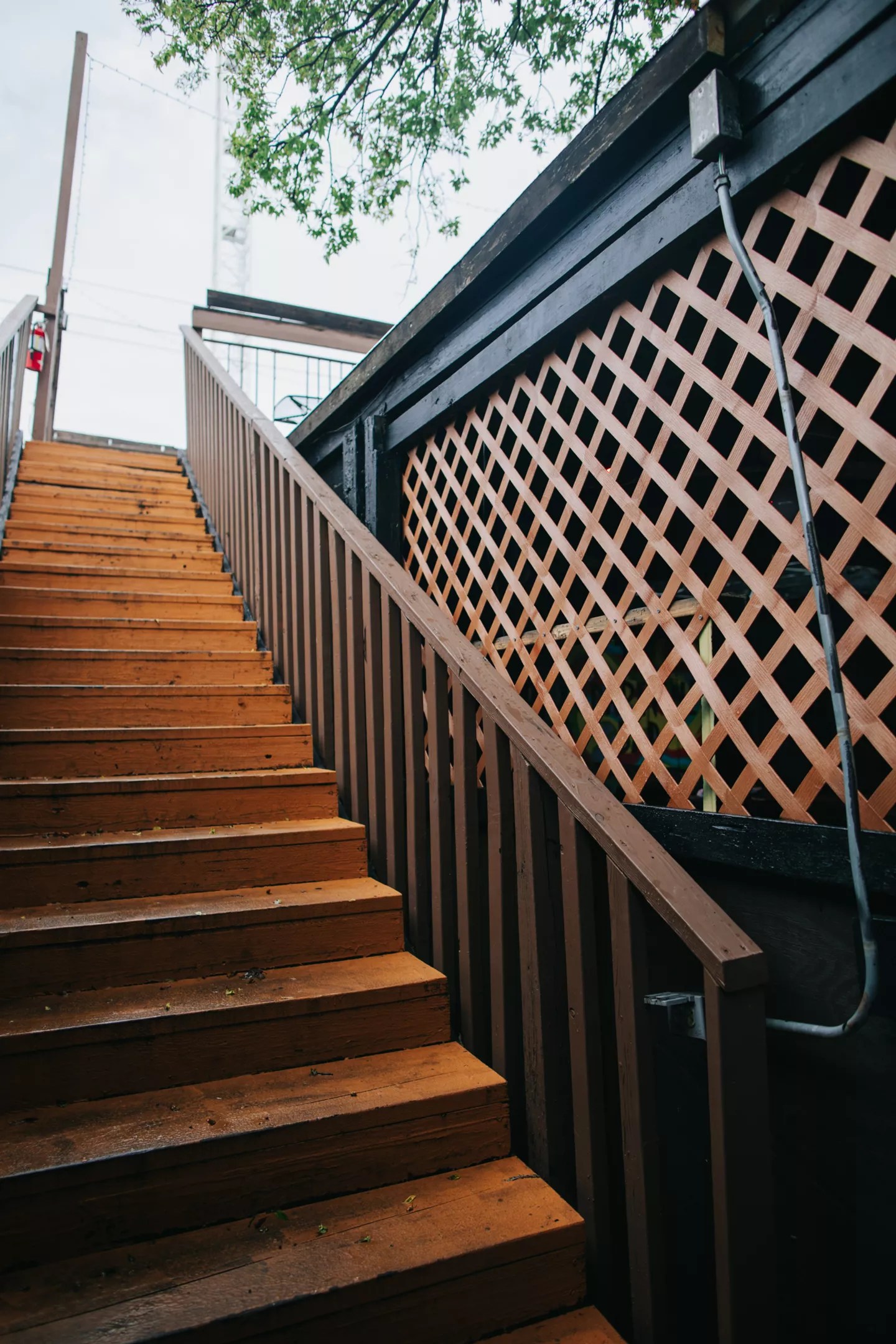
In early June, the Honeas took time to fix up the deck.
Kathy Tran
In early June, the Honeas were taking advantage of the downtime at the bar to fix up a few things. They added a fresh coat of paint to the door that leads to the patio and they were giving the deck a makeover.
Inside, instead of frozen Bellinis and cold beers atop the bar, there were boxes of paper masks stacked at least a foot high. They want to make sure they have enough for staff and customers.
Michelle has been scouring the internet for hand sanitizer, frustrated at obvious price gouging for those much-needed items. They’ve decided that when they do reopen, customers will only be allowed inside to use the restroom, and they’ll be required to wear a mask when doing so.
They’ll make drinks at the bar inside; the outdoor bar could work, but since customers can’t stand or congregate at the bar, per state safety protocols, they figure making all the drinks inside is just safer. They’re also transitioning to all plastic cups and removing fresh fruit from cocktails.
“Our saving grace is the patio. There’s no maximum requirement out there, so we’ll drag all of our tables out, and we’re going to make sure people stay seated and they don’t congregate,” Michelle says.
They still haven’t set a date to reopen.
“If everybody doesn’t do what they’re supposed to do, then we’re doing the right thing for no reason.” – Michelle Honea
They’re frustrated at what they see at other bars across the city, clearly packed.
“If everybody doesn’t do what they’re supposed to do, then we’re doing the right thing for no reason,” Michelle says. “What we’re doing isn’t having an affect the way that it’s supposed to because there’re so many people violating the rules.”
At the time this article was written, Dallas County recorded 413 new cases of COVID-19, a new single day high.
Some customers, meanwhile, are getting restless. In late May, a fan asked via Facebook if there were any news “from our favorite bar” on reopening. Michelle responded that they’re still in a holding pattern.
Another customer saw her answer for what it was and responded:
“Thank you for always doing what is right for your staff and for us customers <3 Looking forward to my favorite patio and staff <3."
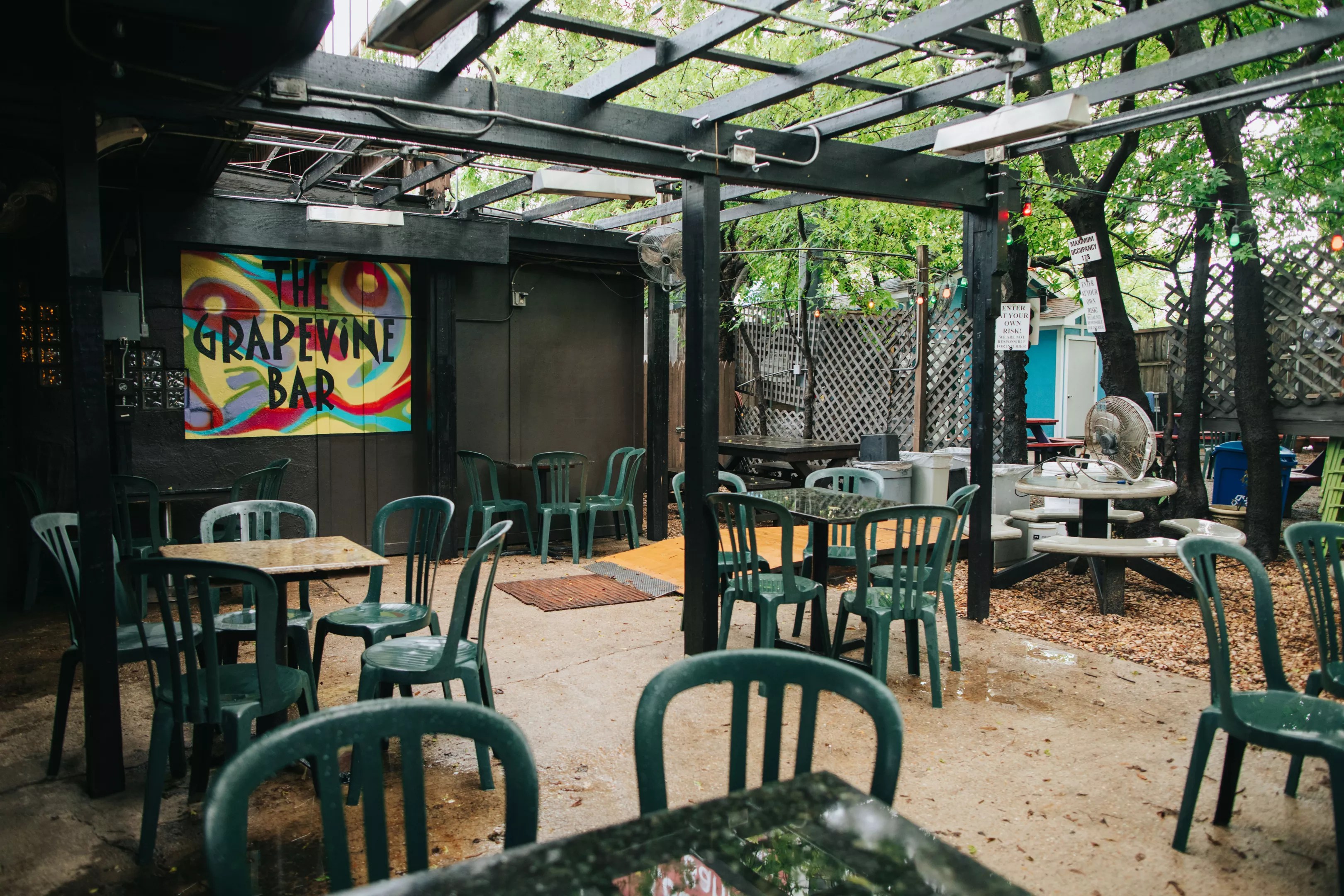
They also touched up some paint on the patio.
Kathy Tran